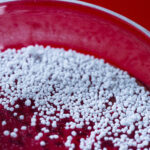Narrowly classified fractions of naturally pure calcium carbonate (CaCO3) in particle sizes from approx. 5 µm to approx. 150 µm (median). We also offer coarse granules up to approx. 4 mm.
eskal test dust
The test dust series eskal is often used for basic research. It helps to determine the particle sizes of the dust exposure which have the greatest influence on the component or filter to be tested. The influence of the particle size on the failure mechanism of the test object can be examined through the quasi-monodisperse distributions of the individual fractions.
More detailed information about the particle size distributions of the fine eskal dusts or the coarser eskal granules can be obtained by clicking on the respective download button.
Classified dusts and sands in various grades made from natural quartz (SiO2). Special screenings are possible upon request. We also offer standardized quartz sands according to DIN 52348, DIN EN 12904 or ECE R112/113/123.
esqua
Quartz is a very common mineral in nature worldwide and is therefore well suited to simulate natural dust exposure. Due to its hardness, it is also often used for wear tests or similar.
In addition to fine quartz dusts, we also offer coarse quartz sands with maximum particle diameters of up to approx. 2 mm. By using very fine quartz dust, however, take the specific health hazard into account. More detailed information about the available grades can be downloaded here.
Further information on standardized quartz dusts and sands can be found under standard test dusts.
Dusts and fractions of corundum (Al2O3) in different grades. Corundum is a very hard and abrasive material and therefore well suited for wear tests.
escor
Our test dusts from the escor series consist of the very hard mineral corundum. Its hardness exceeds that of most other (engineering) materials. Thus, wear can be generated quickly and effectively during abrasion tests.
Choose between a wide variety of particle sizes from very fine to extra coarse. To cover broader distributions, (tailor-made) mixtures are possible.
Native starch, either in regular or in hydrophobic form, narrowly graded into 6 types from approx. 15 µm to approx. 60 µm (median). Soft, roundish particles with smooth surfaces.
esstar test dust
Our test dusts from the esstar series are organic dusts based on native starch. In contrast to the typically used mineral particles, these are softer and also have a smoother surface. They also have a lower density and a higher tendency to electrostatic charging. These deviating properties are of great importance for certain applications in environmental simulation.

